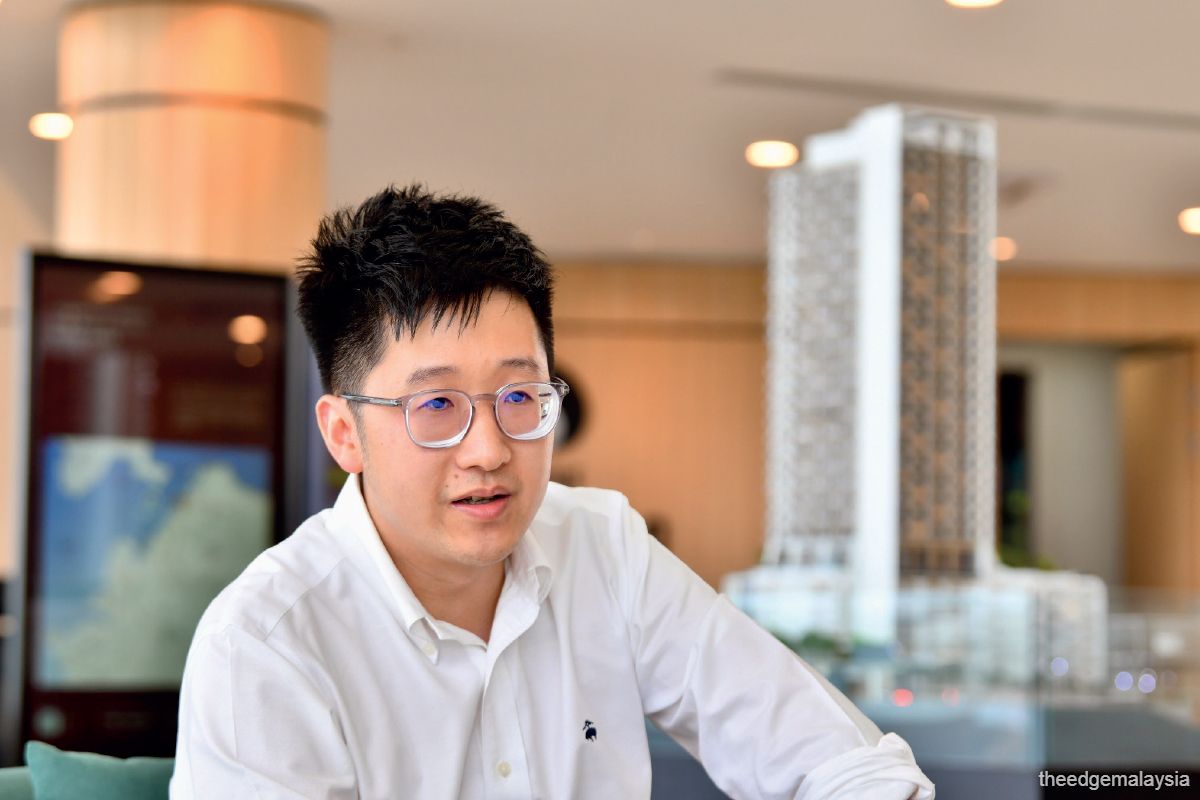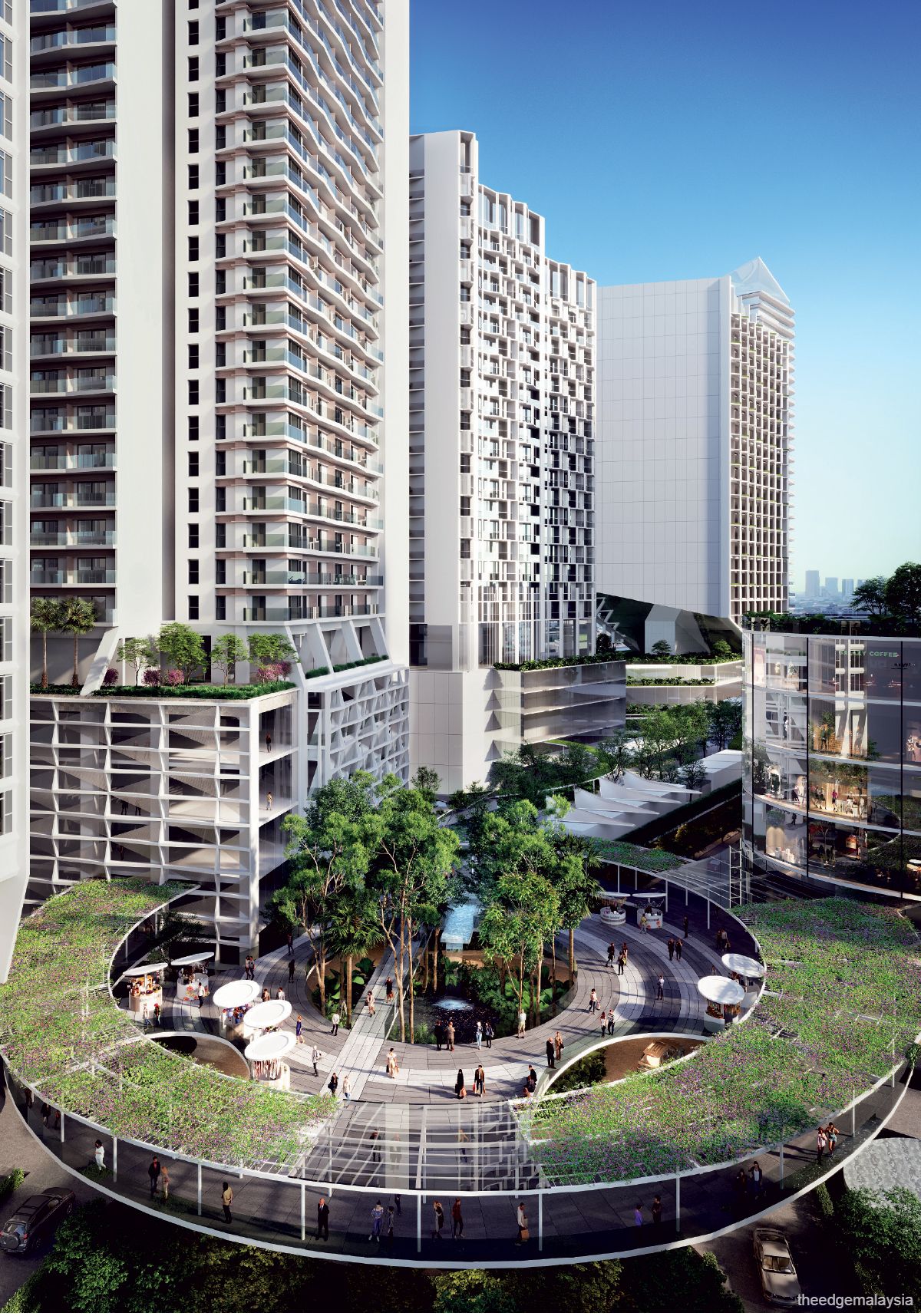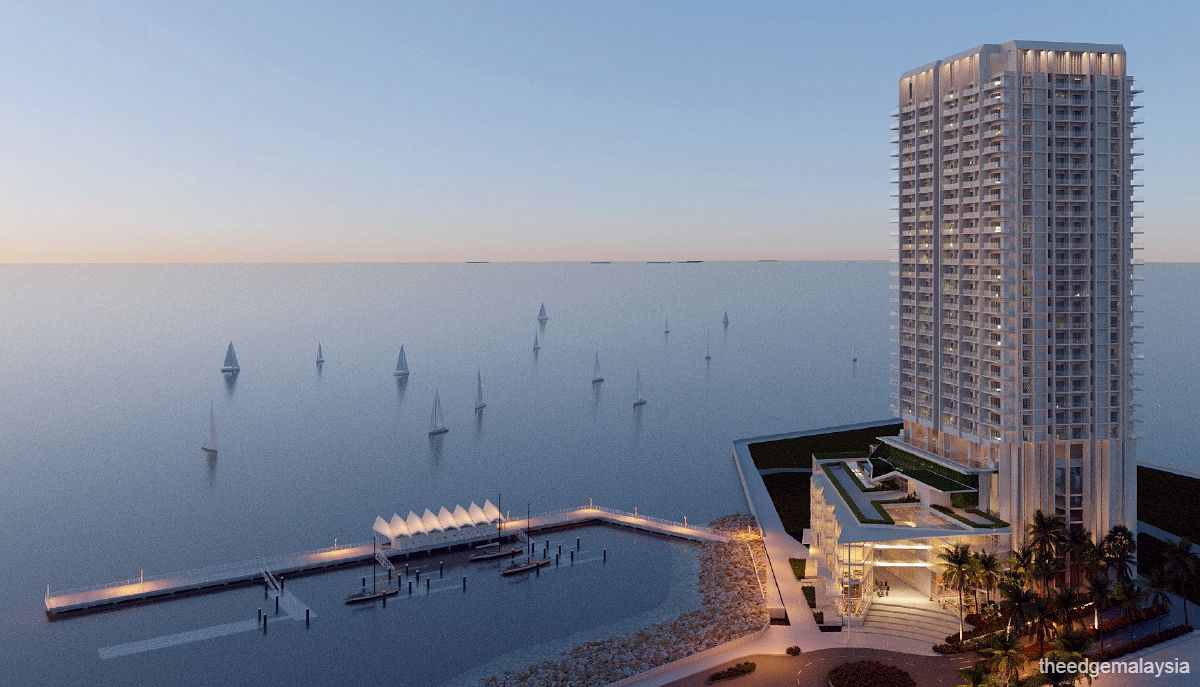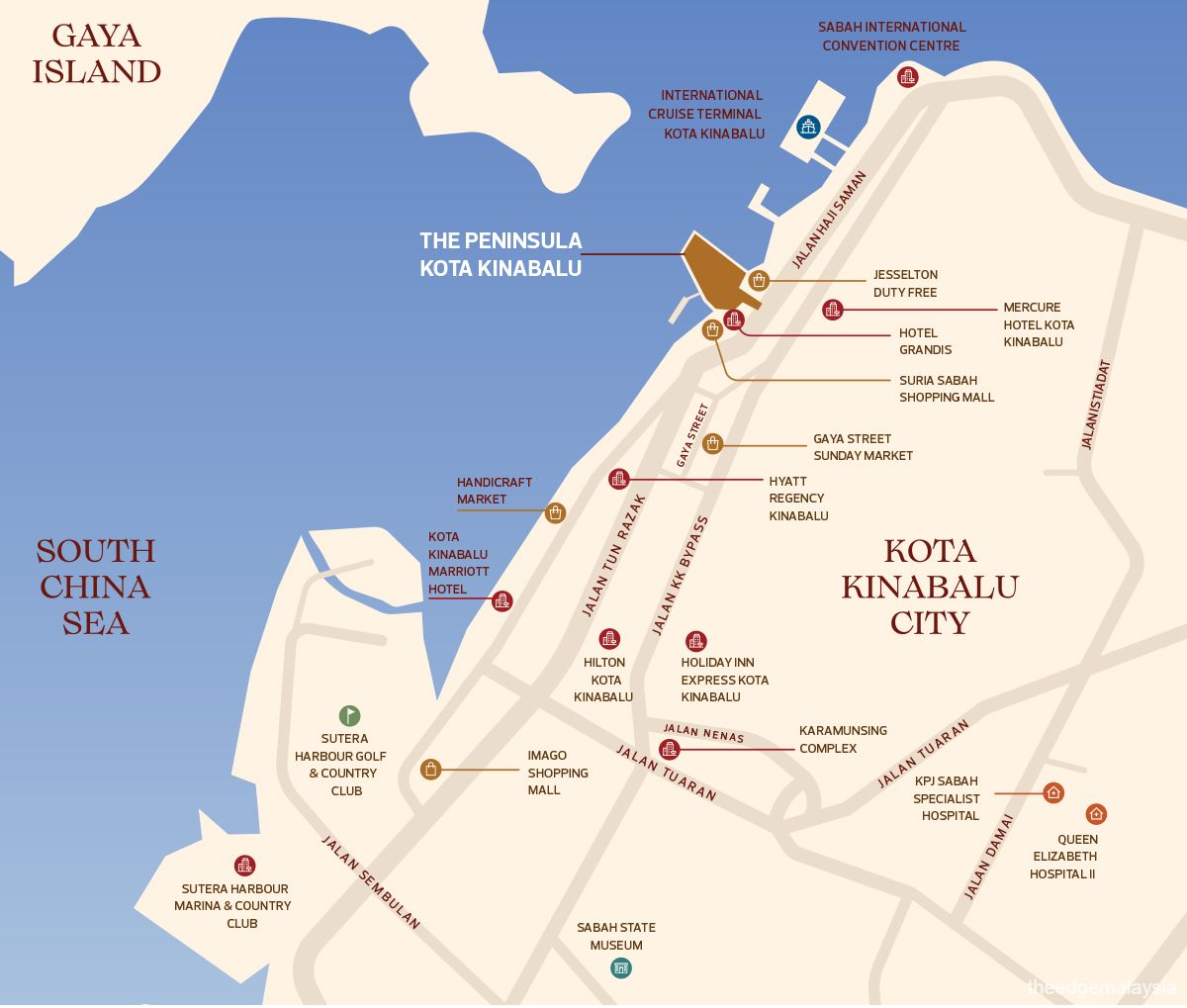
This article first appeared in City & Country, The Edge Malaysia Weekly on March 31, 2025 – April 6, 2025
A new, ambitious mixed-use project, The Peninsula, is set to make its mark in Kota Kinabalu, Sabah. Its developer Trillium Development Sdn Bhd may be a relatively new name in the property development industry, but its parent company MK Group has had a long history in the state.
Founded by the late Datuk Chu Ming Kiang, MK Group started out as Ming Kiang Bookstore in Jalan Gaya, Kota Kinabalu, in 1957. The group also owns several other well-known bookstores in the state, namely The Signature in Karamunsing Complex and Eaton’s in Centre Point Sabah.
Over time, MK Group diversified into distribution, construction, retail, plantations, hospitality, education, IT and publishing.
Under its hospitality division, the group acquired a portion of Likas Square Serviced Apartment (60 apartment units and a retail space) in 2007, the three-star, 188-room Hotel Grandis in 2011 and the Signature Inn in 2021.
For a short period of time, MK Group operated Likas Square as a short-term rental property. “However, because it is a private residence, the authorities do not allow short-term stays anymore. So, we have stopped the [short-term rental] operations there and we’re only holding it for long-term rent,” Clement Chu, CEO of Trillium Development, tells City & Country in an exclusive interview.
The retail portion of Likas Square, with 80 units, is well tenanted. “We have a lot of office units on the upper floors that are occupied by small businesses. On the ground floor, there is a Pick N Pay supermarket and several food and beverage (F&B) shops to serve the needs of the residents and office tenants there,” he says.
Meanwhile, the group acquired Hotel Grandis from its previous developer when it was in the midst of being constructed. Completed in 2014, the hotel has an average occupancy rate of 80%.
Hotel Grandis marked the group’s pivot into property development. “The structure was partially completed when we took over. There were a lot of limitations when it came to the design because all the walls were already fixed. We wanted to build a building from the ground up and that somehow inspired us to realise our vision [and venture into property development],” says Chu.

Even though many new projects are being introduced, increasing the overall supply, location remains a key factor in determining long-term property value. This is where The Peninsula stands out — its seafront positioning and integrated lifestyle elements create a development that is not easily replicated.” — Chu (Photo by Sam Fong/The Edge)
Building its flagship
In 2016, the group set up its property arm with the establishment of Trillium Development and it is now focusing on building its flagship project, The Peninsula.
With an estimated gross development value (GDV) of RM3.5 billion, the mixed-use development will occupy 14.89 acres of reclaimed land next to Jesselton Point Ferry Terminal. The master plan comprises four towers with commercial suites as well as a three-star hotel, a five-star hotel, an office tower, a shopping mall, a retail block and two residential towers..
To be developed in five to six phases depending on market conditions, the development is expected to be completed in eight to 10 years. Phase 1 — comprising the three-star hotel and one of the towers with commercial suites, known as Agate Tower — was launched in 2024.
“The three-star hotel, named Peninsula Grandis, is a business hotel with 423 rooms. It is designed to be a city hotel for business travellers and tourists,” says Chu.
With an estimated GDV of RM377 million, Agate Tower will have 408 units with built-ups of 556 to 1,140 sq ft. The selling price is RM1,000 psf.
Agate Tower is designed as an investment product that caters for short-term rental and the developer will offer management services to buyers. “We offer unit purchasers the option of letting us manage their units for them. This is also to preserve the value of the property because when you have too many operators inside, it can be very hard to control the quality of what the tenants are getting,” he says.
The management services will be charged based on a profit-sharing model, whereby the rent collected will be split between the unit owner and the developer. For now, the ratio of the split is not yet confirmed as it still needs to be fine-tuned.
Since its launch, Agate Tower has achieved a take-up rate of 70%, with 70% to 80% of its buyers comprising Sabahans while the rest are from Peninsular Malaysia and overseas such as China, Taiwan and Brunei.
Chu says there is even an American buyer. “We were quite surprised by this. The buyer saw a small-scale model of The Peninsula in the lobby of Hotel Grandis when staying there and came to our sales gallery to purchase a unit.”
Viewing the take-up rate of the first phase as a positive indicator, the developer plans to soft-launch Phase 2 on April 11. It will comprise another tower with commercial suites, named Aris Tower, and a 3-storey retail block.
Aris Tower will have an estimated GDV of RM433 million and offer 511 units with built-ups of 533 to 1,357 sq ft. At RM1,100 psf, its selling price is slightly higher than that at Agate Tower.
“One of the biggest differences between Aris Tower and Agate Tower is that the former will sit directly in front of the sea where it will get breathtaking views of the water and is also seamlessly connected to a 650m waterfront boardwalk,” says Chu, adding that the retail block will be located at the boardwalk.
“This is very exciting because we will be offering lifestyle experiences and F&B options where you can dine in front of the sea. The boardwalk dining is inspired by Pavilion Kuala Lumpur’s atrium, where all the bars have an open-air setting.”
The 3-storey retail block will have 52 units with built-ups of 236 to 2,690 sq ft. Chu says the retail block will be owned and managed by the developer, and will be available for lease.
The ground floor units will have double-volume ceilings to give them a spacious feel and come with a mezzanine floor for space efficiency. There will be an observation deck on the rooftop for those who want to dine or chill while enjoying the view of Sabah’s pristine sunset.
As for the subsequent phases, Phase 3 will comprise the last two towers with commercial suites; Phase 4 will feature an office tower, a five-star hotel and a shopping mall; and the final phase will introduce two residential towers that cater for upmarket buyers.
The residential towers will be located at the furthest end of the site, affording owners the best unobstructed seafront view. Planned as a low-density development, the towers will have 90 units each, with only two or three units on every floor.
Further details of the subsequent phases are not available yet because they are still in the planning stage.

A one-acre elevated public park will connect all the nine towers and retail components to encourage people to walk around the development (Photo by Trillium Development)
Enhanced connectivity and convenience
Chu says the company envisions The Peninsula as a city within a city. It will be a self-contained space where one can live, work and play. “The whole project is designed to afford connectivity and convenience, where you can relax at our hotels or have a meal at the waterfront.”
The development’s concept was inspired by several projects he had visited while in China. “Growing up in Kota Kinabalu, we always felt that there was a lack of nice integrated developments with good public spaces. In China, they have a lot of mixed-use developments with very large public spaces and they encourage you to walk and explore. We wanted to bring that concept here.”
To achieve that goal, getting the right people and experts on board is a priority. The developer has engaged architectural firm GDP Architects and Bangkok-based landscape architectural firm L49 to plan and fulfil Trillium Development’s vision.
“We will have nine towers and retail components. To connect all of them, we will have a one-acre elevated central park. This public space will be fully pedestrianised while vehicular traffic will be below the park. This is to encourage people to walk around the development,” Chu explains.
There will also be a 650m waterfront boardwalk that runs along the perimeter of the development. “The boardwalk will enhance public access to the sea, providing a scenic and inviting space for walking, jogging and leisure activities,” he says, adding that the boardwalk will feature Kota Kinabalu’s new jetty that will be a gateway to the Tunku Abdul Rahman Marine Park for tourists and replace the current Jesselton Point Ferry Terminal.
According to Chu, the Sabah government engaged the group to build a new jetty at the site in 2021. “Jesselton Point Ferry Terminal is quite an old jetty [dating back to the British era] and the state government had always wanted to invest in and build a new one.” He says there are safety concerns as well because the old jetty was built with old timber piles and some of the timber has started rotting.
There will be three entry points into The Peninsula — via Jalan Haji Saman, the current entry to the site from the back of Suria Sabah Shopping Mall and an upcoming road along the coast.

The second phase will include Aris Tower with commercial suites as well as a 3-storey retail block that is linked to a 650m waterfront boardwalk (Photo by trillium development)
Reclaiming a 14.89-acre site
Chu says the company decided to conduct reclamation works for the site due to the geographical limitations of Kota Kinabalu’s central business district.
“KK is a very narrow city. You have the coast on one side and the mountain on the other, not to mention the airport. There’s a three-way squeeze on the city. So, land is very limited and we wanted to do a large-scale integrated development in the heart of the city, and the only way was to look at reclamation.”
The reclamation works took more than five years to complete. “From identifying the land and going through the environmental impact assessment process to getting approvals from the authorities, it took close to five years to secure the site. Then, the actual reclamation works took another two years.”
While reclamation was going on, the developer had to make sure that the environmental impact on the sea was minimal. “So, we built a cofferdam first to ensure that whatever we filled in did not disperse out to sea,” Chu explains.
Besides that, the group maintained communication with local fishermen through the Environment Protection Department to inform them of the progress of the construction works, knowing that their travelling routes would be impacted. “We made sure they were aware that there was a reclamation project going on, so that they could plan their routes. It’s mainly their routes to the sea [that were affected].”

Positive outlook in a competitive market
Chu remains optimistic about the local market despite the ever-growing supply of investment-driven properties, especially those that cater for short-term accommodation.
“Tourism continues to be a major driver of demand, with the city attracting both domestic and international visitors. This sustains the need for short-term accommodation, making investment-driven properties an attractive asset class. With increasing flight connectivity and KK’s growing reputation as a luxury and eco-tourism hub, we anticipate a rise in demand for well-managed Airbnb and hospitality-centric properties,” he says.
“At the same time, KK’s geographic constraints make land supply extremely limited, as the city is bordered by the sea on one side and mountains on the other. This natural limitation means that prime, well-located waterfront developments hold enduring value,” he adds.
“Even though many new projects are being introduced, increasing the overall supply, location remains a key factor in determining long-term property value. This is where The Peninsula stands out — its seafront positioning and integrated lifestyle elements create a development that is not easily replicated.”
Survival of the fittest
Property consultant Knight Frank Malaysia (Sabah) Sdn Bhd executive director Alexel Chen is generally optimistic about the outlook for the Kota Kinabalu hospitality industry. This is despite the oversupply situation in the city.
“Hospitality products are often viewed as riskier in the eyes of banks because they are seasonal. The banks we deal with constantly ask whether there’s oversupply and if there’s sufficient demand. My general response is yes, there is demand … We’re fortunate that our hotel performance tends to peak during key periods like Chinese New Year, mid-year holidays and year end.”
Chen opines that the optimism has led to fierce competition among developers, as most are providing hospitality products. “With this optimism, everyone is entering the same sector, which raises some concerns. Not everyone will succeed in this space [due to the stiff competition].
“The success of a development comes down to the developer and its ability to deliver. Some developers may end up with a ‘white elephant’. In this case, I believe MK Group is very strong — it is financially sound, which is crucial,” he says, adding that the group has built a reputation beyond real estate.
“While the group may not have an extensive track record as a developer, it has built a strong reputation in other sectors, such as government projects and oil palm estates. Financially, MK Group is in a better position compared with many local developers.”
All eyes will be on Trillium Development as it carves a place for itself in the property development industry in Kota Kinabalu with The Peninsula.
Save by subscribing to us for your print and/or digital copy.
P/S: The Edge is also available on Apple’s App Store and Android’s Google Play.






